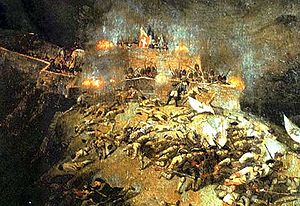| Battle of Assietta | |||||||
|---|---|---|---|---|---|---|---|
| Part of the War of the Austrian Succession | |||||||
 The death of the Chevalier de Belle-Isle, Famille le Clerc | |||||||
| |||||||
| Belligerents | |||||||
|
|
| ||||||
| Commanders and leaders | |||||||
| Giovanni di Bricherasio | Chevalier de Belle Isle † | ||||||
| Strength | |||||||
| 7,000-15,000[1] | 25,000-40,000[1] | ||||||
| Casualties and losses | |||||||
| 299 killed or wounded[2] | 5,300–6,400 killed or wounded[2] | ||||||
Location within Italy | |||||||
The Battle of Assietta was a significant engagement of the War of the Austrian Succession and pitted a numerically superior French force of 25,000 men[1] under the command of Louis Fouquet, Chevalier de Belle-Isle against a Sardinian army of 15,000 men[1] led by Giovanni Bricherasio. The French were soundly defeated and their commander, Belle-Isle, killed during the course of the battle. The siege was part of the Italian campaign of the War of the Austrian Succession, in which Habsburgs and Bourbons contested for domination over Northern Italy and the various Italian states. The Kingdom of Sardinia joined the war on the side of the Pragmatic Allies in 1742 and rallied itself to Maria Theresa's cause. There were also concerns about growing French influence in its territories. The war in Italy had already been going on for seven years, and the Sardinian army had already suffered several defeats in the field, leading to them opting for a more defensive approach. The French led several expeditions in Italy during the war, combining their forces with the Spanish Bourbons to accomplish their political aims.[1][2]
By 1747, the war was coming to an end, but the French were still interested in acquiring more influence in Italy, and so dispatched an army under the command of Belle-Isle to capture Colle dell'Assietta from the Sardinians. The French army organised into thirty-two battalions,[1] encountered fortified Sardinian positions at the Susa Valley, and launched wave after wave of fruitless assaults on their fortifications. The French divided their forces into four columns and launched several assaults personally led by Belle-Isle. They were all repulsed with heavy casualties inflicted, and Belle-Isle himself was killed, whereupon a retreat was ordered. The Sardinians suffered only light casualties, while the French had over a fifth of their force killed or wounded. The Sardinian victory proved to be the last major battle in the Italian campaign of the war.[1][2]

